#Khan academy Script
Explore tagged Tumblr posts
Text
Upcoming Star Trek projects in the order that I'm most excited for them (an asterix indicates projects that don't actually exist. Yet.)
Lower Decks, season 5
Prodigy, season 3*
Lower Decks, revival series*
Seven of Nine series (without Terry Matalas)*
Strange New Worlds, season 3
Untitled prequel film
Starfleet Academy
Untitled Tawny Newsome sitcom
Deep Space Nine continuation anime*
Seven of Nine series (with Terry Matalas)*
Untitled fourth JJ Abrams movie
Wesley Crusher "Doctor Who" Ripoff*
Trek universe "West Wing"-style political drama*
What We Do in the Cube: a wacky slice of life sitcom about 4 plucky Borg Drones as they go about their daily routine (regenerating, processing data, assimilating people)*
"Vikings", but with Klingons* (actually, this would kick ass, never mind)
"Game of Thrones," but with Klingons*
"Bridgerton", but with Klingons*
"Bridgerton", but with Ferengi*
Some kind of Trek universe procedural drama*
Some kind of Trek universe medical drama*
The Erotic Adventures of Neelix: A Prequel about Voyager's Most Beloved Character*
Lwaxana Troi Soap Opera*
Vulcan Love Slave adaptation*
Vulcan Love Slave 2: The Revenge*
Some kind of buddy sitcom about Okona and Jack Crusher Jr. being roommates*
Star Trek Vs. Star Wars: a movie trilogy written by the most obnoxious assholes on Spacebattles.com*
Khan Ceti Alpha V scripted podcast
The Wizarding World of Harry Kim: Harry Kim discovers that all of the weirdness that has always surrounded his life is because he's the long-lost child of a whimsical secret world of wizards. Also, they have slaves.*
A series based on one of those 200,000 nigh-identical grimdark pitches from after Enterprise ended about the Federation going into decline in the future*
Um...
Section 31 movie.
95 notes
·
View notes
Text
The Great College Lie: Why Degrees Don’t Mean Success

For years, we’ve been fed the same script: Go to college, get a degree, and the world will roll out a red carpet to your success. Sounds simple, right? Except, for many, that “red carpet” feels more like a never-ending hamster wheel of debt, underemployment, and job applications that go straight into the void. So, what happened? Did college lie to us, or did we buy into a dream that was never designed to include everyone?
Let’s dissect The Great College Lie—why the degree doesn’t guarantee success, and what you can do to thrive despite the system.
1. The Promise vs. Reality
The Promise:
College is marketed as the “great equalizer.” They told us education would unlock the American Dream: a steady career, financial security, and a house with a white picket fence. And sure, for some, it worked. But for many others, here’s the reality:
The Reality:
Student Loan Debt: The average college graduate in the U.S. owes $37,000+ in student loans, which can take decades to pay off.
Underemployment: Over 40% of college graduates work jobs that don’t require a degree (hello, barista jobs with a philosophy major).
No Guarantees: That diploma doesn’t protect you from layoffs, market crashes, or a rapidly evolving job market that now demands experience over credentials.
2. Why Degrees Don’t Equal Success
1. It’s About Who You Know, Not What You Know
Networking often outranks education. Studies have shown that up to 70% of jobs are never even posted publicly—they’re filled through connections. Translation? You can have a degree from Harvard, but Chad with zero qualifications might get the job because his dad plays golf with the CEO.
2. Degrees are Losing Their Edge
A bachelor’s degree used to set you apart. Now? It’s almost like having a high school diploma. Everyone has one, which means the competition is fiercer, and employers are raising their standards to include master’s degrees and certifications.
3. The Skills Gap is Real
A piece of paper doesn’t always mean you have the skills employers need. A 2021 survey revealed that 46% of employers feel recent grads aren’t prepared for the workforce. Critical thinking, problem-solving, and real-world experience often trump textbook knowledge.
3. The Student Loan Scam
Let’s call it what it is: a scam. The system was designed to profit off your dreams. Here’s how it works:
Colleges Overpromise: They lure students with flashy marketing, luxurious dorms, and vague promises of a “bright future.”
Loans Trap You: The government and private lenders make it easy to borrow, but repayment terms keep you financially enslaved for decades.
Inflated Costs: College tuition has skyrocketed over 1200% since 1980, far outpacing wage growth. So, you’re borrowing more but earning less.
4. “But College is Still Worth It, Right?”
It depends. For some fields—like medicine, law, and engineering—a degree is non-negotiable. But for many careers, it’s becoming clear that skills and experience matter more than credentials.
Here’s the Shift:
Trade Schools and Certifications: Electricians, plumbers, and tech professionals often earn just as much (or more) than degree holders—with a fraction of the debt.
Freelance and Entrepreneurial Skills: The internet has opened doors to self-taught careers in writing, design, coding, and more.
On-the-Job Learning: Companies like Google, Tesla, and IBM no longer require degrees for many positions—they value skills instead.
5. So, What Should You Do Instead?
1. Learn Marketable Skills
Platforms like Coursera, Udemy, and Khan Academy offer affordable (sometimes free) courses on coding, graphic design, marketing, and more.
The ROI on these courses often far exceeds a traditional degree.
2. Network, Network, Network
Attend local events, join LinkedIn groups, and connect with mentors in your field.
Remember: Jobs often go to those with connections—not just qualifications.
3. Embrace Lifelong Learning
The job market evolves constantly. Staying ahead means continually updating your skills, whether through certifications or self-study.
4. Question the Narrative
Don’t blindly follow the “go to college” script. Ask yourself: What do I want to do, and is college the best path to get there?
6. The Humble Truth About Success
Here’s the real kicker: Success isn’t tied to a degree—it’s tied to your grit, adaptability, and willingness to hustle smart.
Degrees can help, but they aren’t the golden ticket we were promised.
Building real-world skills, learning to market yourself, and forming relationships will often get you farther than any diploma can.

What They Don’t Want You to Know
The Great College Lie isn’t just about the myth of guaranteed success—it’s about the systems that profit from your hopes and dreams. College can be a valuable tool, but it’s not the only path to success.
The sooner we stop glorifying degrees and start valuing skills, effort, and innovation, the better off we’ll all be. In the meantime, let’s admit one thing: We were all sold a dream. But it’s not too late to wake up and rewrite the story.
#CollegeDebt#HigherEducationScam#CareerSuccess#StudentLoans#EducationCritique#LifeAfterCollege#Humor#TruthBombs#trends#news#world news#ModernCulture#SocialCommentary#CulturalCritique#EchoChamberCulture#MoralOutrage#fitness#please share#ReflectionRegret#RelatableTrash#funny post#funny memes#funny stuff#funny shit#humor#jokes#memes#lol#haha#societyandculture
29 notes
·
View notes
Note
it seems like my ask from a few days ago didn’t get sent 😭 argh stupid tumblr
i was basically asking there what resources you would recommend for everything that could be useful for neocities,, like html, css,,(and you mentioned java script i think?) especially beginner-beginner stuff and then maybe for intermediate 👉👈 i know you probably have all those on your blog already but you know me in a bit 😵💫
also yes i’d love to work on ours together, even if we didn’t make them match! cause you know you have millions of brilliant ideas :33 🌻🌻💛
Hiya,
These are the stuff I used / still use, hope it's useful:
W3Schools
Mozilla Developer Network (MDN)
Codecademy
freeCodeCamp
Khan Academy HTML/CSS Course
Shay Howe's HTML and CSS tutorial
HTML Dog
CSS-Tricks
CSS Layout
Flexbox Froggy
Grid Garden
CSS Zen Garden
CSS Animation
Try them out and see what works best for you! 👍🏾
#my asks#resources#coding#codeblr#progblr#programming#studyblr#studying#comp sci#computer science#programmer#html css#html#css
357 notes
·
View notes
Text
Free AI Tools
Artificial Intelligence (AI) has revolutionized the way we work, learn, and create. With an ever-growing number of tools, it’s now easier than ever to integrate AI into your personal and professional life without spending a dime. Below, we’ll explore some of the best free AI tools across various categories, helping you boost productivity, enhance creativity, and automate mundane tasks.
Wanna know about free ai tools
1. Content Creation Tools
ChatGPT (OpenAI)
One of the most popular AI chatbots, ChatGPT, offers a free plan that allows users to generate ideas, write content, answer questions, and more. Its user-friendly interface makes it accessible for beginners and professionals alike.
Best For:
Writing articles, emails, and brainstorming ideas.
Limitations:
Free tier usage is capped; may require upgrading for heavy use.
Copy.ai
Copy.ai focuses on helping users craft engaging marketing copy, blog posts, and social media captions.
2. Image Generation Tools
DALL·EOpenAI’s DALL·E can generate stunning, AI-created artwork from text prompts. The free tier allows users to explore creative possibilities, from surreal art to photo-realistic images.
Craiyon (formerly DALL·E Mini)This free AI image generator is great for creating quick, fun illustrations. It’s entirely free but may not match the quality of professional tools.
3. Video Editing and Creation
Runway MLRunway ML offers free tools for video editing, including AI-based background removal, video enhancement, and even text-to-video capabilities.
Pictory.aiTurn scripts or blog posts into short, engaging videos with this free AI-powered tool. Pictory automates video creation, saving time for marketers and educators.
4. Productivity Tools
Notion AINotion's AI integration enhances the already powerful productivity app. It can help generate meeting notes, summarize documents, or draft content directly within your workspace.
Otter.aiOtter.ai is a fantastic tool for transcribing meetings, interviews, or lectures. It offers a free plan that covers up to 300 minutes of transcription monthly.
5. Coding and Data Analysis
GitHub Copilot (Free for Students)GitHub Copilot, powered by OpenAI, assists developers by suggesting code and speeding up development workflows. It’s free for students with GitHub’s education pack.
Google ColabGoogle’s free cloud-based platform for coding supports Python and is perfect for data science projects and machine learning experimentation.
6. Design and Presentation
Canva AICanva’s free tier includes AI-powered tools like Magic Resize and text-to-image generation, making it a top choice for creating professional presentations and graphics.
Beautiful.aiThis AI presentation tool helps users create visually appealing slides effortlessly, ideal for professionals preparing pitch decks or educational slides.
7. AI for Learning
Duolingo AIDuolingo now integrates AI to provide personalized feedback and adaptive lessons for language learners.
Khanmigo (from Khan Academy)This AI-powered tutor helps students with math problems and concepts in an interactive way. While still in limited rollout, it’s free for Khan Academy users.
Why Use Free AI Tools?
Free AI tools are perfect for testing the waters without financial commitments. They’re particularly valuable for:
Conclusion
AI tools are democratizing access to technology, allowing anyone to leverage advanced capabilities at no cost. Whether you’re a writer, designer, developer, or educator, there’s a free AI tool out there for you. Start experimenting today and unlock new possibilities!
4o
5 notes
·
View notes
Text
Geeta Kapur criticises followers-based casting in Bollywood, calls it unfair: I really feel dangerous for many who study the craft
Geeta Kapur criticises followers-based casting in Bollywood, calls it unfair: I really feel dangerous for many who study the craft Jun 21, 2025 09:32 PM IST Geeta Kapur expressed her disappointment about folks faking the craft on social media and nonetheless getting forged due to followers. Choreographer Geeta Kapur, who has helmed the choreography for a number of well-liked movies together with Heyy Babyy, Saathiya, Duplicate, Tees Maar Khan and extra, not too long ago expressed her disappointment in an interview with Hindi Rush over the rising development of casting actors in movies primarily based on their social media following. (Also Read: Geeta Kapur admits some components of actuality exhibits are scripted: ‘Everyone enjoys peeking into others’ lives’) Geeta Kapur slams hiring actors on the idea of followers in Bollywood. Geeta Kapur on casting actors primarily based on their followingGeeta feels that the development is unfair however not fully improper, and added, "These days, even recruitment happens based on follower count. It took me 8–10 years to genuinely build 2.3 million followers. And some people just appear overnight with 23 million followers. It's a different world. That system is something else. I think talent is separate but if someone makes their hold in 15 seconds and grabs your attention, then they are doing something right." She added, "There are many talented actors in the industry who truly deserve a chance, but if this is the trend now, it’s unfair, but not wrong. I think it's unfair for the people who work on their craft. I feel bad for those who actually spend time learning the craft. I’m also amazed by people who manage to convince others they know the craft, without actually knowing it. It's a very strange circle of life. You put a dancing video, people liked it, and your followers increased. Now, these people say we'll teach you dance, and people get convinced and go to them. You don't see their experience, but just the viral dance. It's very screwed up." Geeta additionally recalled how folks used to supply her the chance to open a dance academy in her title and wished her to show, however at the moment, she was busy. She revealed that many additionally provided her to simply be the face of the academy, however she rejected it as a result of she felt prefer it was dishonest. About Geeta KapurGeeta is a famend Indian choreographer and tv character greatest identified for her work in Bollywood and actuality dance exhibits. Starting as an assistant to choreographer Farah Khan, Geeta gained fame choreographing quite a few hit songs throughout a long time together with Sheila Ki Jawani, Mere Mehboob Mere Sanam and extra. Often known as “Geeta Maa” by her followers and actuality present contestants, she has judged well-liked dance exhibits like Dance India Dance, Super Dancer, and India’s Best Dancer, and is admired for her emotional reference to dancers. Read More: https://news.unicaus.in/entertainment/bollywood/geeta-kapur-criticises-followers-based-casting-in-bollywood-calls-it-unfair-i-really-feel-dangerous-for-many-who-study-the-craft/
0 notes
Text
From Creativity to Code: How Gen AI is Redefining Human Potential Across Industries
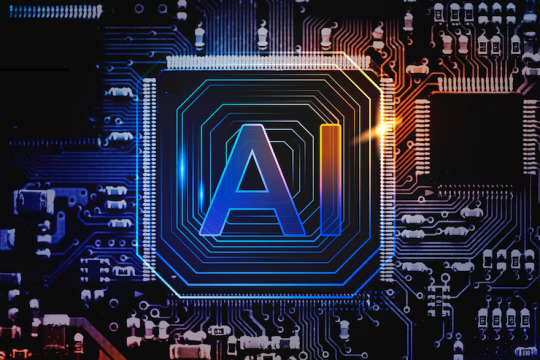
In a world where innovation never sleeps, Generative AI has burst onto the scene as one of the most transformative technologies of our time. Once confined to academic labs and sci-fi fantasies, today Gen AI is designing logos, writing code, composing music, creating 3D models, and even assisting in medical diagnoses. The rise of this creative yet analytical force is redefining what it means to be human in the digital age.
As businesses and individuals alike scramble to harness its power, there's no better time to explore how Gen AI is revolutionizing industries and why upskilling with Generative AI courses in Bengaluru is becoming a strategic move for professionals in every field.
What Is Generative AI?
At its core, Generative AI refers to algorithms often based on deep learning models that can generate new content. Unlike traditional AI, which is usually predictive or analytic, Generative AI is creative. It doesn’t just analyze data; it creates something new from it. Whether it’s a hyper-realistic image, a poem, a business strategy, or a computer program, Gen AI models like GPT-4, DALL·E, Midjourney, and GitHub Copilot are opening doors to previously unthinkable possibilities.
The technology relies on training datasets to understand language, patterns, and context, allowing it to generate human-like content. Its applications span from visual arts to complex automation, offering tools that extend human capability rather than replace it.
Gen AI in Action: Industry Transformations
1. Media and Entertainment: A New Canvas
Filmmakers, artists, writers, and designers are using Gen AI as a creative partner. AI tools can now storyboard scenes, generate scripts, design characters, and even compose background music. For instance, Netflix reportedly explores AI-driven script generation, while Adobe's Firefly lets creators enhance visuals using simple text prompts.
2. Marketing and Advertising: Personalized at Scale
Gen AI enables hyper-personalized content at scale. Marketers use it to generate audience-specific ad copy, social media posts, and even entire campaign ideas. Tools like Jasper AI and ChatGPT allow real-time brainstorming, making content creation faster and more tailored than ever before.
3. Healthcare: A Diagnostic Powerhouse
In healthcare, Gen AI helps interpret medical images, generate diagnostic reports, and even simulate drug molecules. While doctors still lead the process, AI augments decision-making, reducing time and increasing accuracy. Tools like IBM Watson Health and Google’s Med-PaLM show how AI is reshaping clinical workflows.
4. Education: Intelligent Tutoring and Content Creation
Gen AI is reshaping how we learn. From AI-generated textbooks and assessments to personalized tutoring assistants, platforms like Khanmigo (by Khan Academy) offer tailored learning experiences. AI is also empowering educators to build content in record time.
5. Software Development: Code on Autopilot
Perhaps one of the most exciting applications is in software development. GitHub Copilot, powered by OpenAI, can write code, debug, and even suggest improvements in real time. Developers save hours of time, shifting focus from writing syntax to solving complex architectural problems.
The Human-AI Collaboration: A New Era of Productivity
One of the greatest misconceptions is that AI will replace humans. The reality? It’s more about collaboration. Gen AI amplifies human creativity and intelligence. Artists now work faster, marketers are more strategic, and developers more productive. This symbiosis represents a profound shift in how we define talent and output in the workplace.
It also means the skillsets required in the modern workforce are evolving rapidly. Knowing how to use Gen AI tools responsibly and effectively is becoming just as important as traditional domain expertise.
Why Bengaluru Is Becoming a Gen AI Learning Hub
Bengaluru India’s Silicon Valley is no stranger to technological revolutions. As AI and tech firms mushroom across the city, demand for skilled professionals in AI, machine learning, and especially Generative AI has surged. Startups, multinational corporations, and research institutions are actively seeking talent who can integrate AI into creative and technical workflows.
This rising demand is fueling interest in Generative AI courses in Bengaluru, where learners can gain hands-on experience with real-world projects, industry tools, and mentorship from experts. Whether you're a software engineer, a designer, a marketer, or a business strategist, these programs offer a strategic pathway to stay competitive in the age of intelligent machines.
What to Look for in a Generative AI Course
Not all courses are created equal. When choosing a Generative AI course, consider the following:
Hands-On Learning: Look for programs that let you build real-world projects like generating music, writing scripts, or coding with AI.
Industry-Relevant Tools: Courses should cover tools like ChatGPT, DALL·E, Midjourney, Runway ML, Stable Diffusion, and GitHub Copilot.
Expert Mentorship: Learn from professionals with real-world Gen AI implementation experience.
Ethical AI Education: With great power comes great responsibility. The best courses emphasize ethical use, bias mitigation, and transparency.
Placement Support: A good program connects you with hiring partners or helps you freelance using Gen AI skills.
Building Trust with Gen AI: Ethics and E-E-A-T
As Gen AI content floods the internet, Google’s E-E-A-T framework Experience, Expertise, Authoritativeness, and Trustworthiness becomes more vital than ever. For professionals using Gen AI, it’s essential to establish credibility by:
Disclosing when AI was used to generate content
Verifying facts and data sourced through AI tools
Building a personal or brand voice that’s distinct and human
Developing expertise in prompting, editing, and refining AI-generated outputs
The future isn’t about man versus machine—it’s about man with machine. And trust will be the currency that separates leaders from the rest.
Final Thoughts: Don’t Just Consume, Create with Gen AI
We are living through a creative renaissance powered by technology. From artists and coders to entrepreneurs and educators, Gen AI is unlocking a new kind of human potential one that blends intuition with innovation.
If you want to be a part of this transformation, the best place to start is by learning the tools and techniques behind it. Enrolling in Generative AI courses in Bengaluru isn’t just a career move, it’s an investment in the future of work, creativity, and human collaboration.
Are you ready to turn your ideas into innovation with the help of Gen AI? The future is waiting for you to create it.
0 notes
Text
How to Prepare for a Data Analytics Course: A Comprehensive Guide
Data analytics is a field that’s not only in demand but also vital for decision-making in today’s data-driven world. Whether you're looking to upskill for your career or start a new journey, preparing well for a data analytics course is crucial to getting the most out of your learning experience. In this blog, we’ll walk you through practical tips to help you prepare and excel in your data analytics course.
1. Understand the Basics of Data Analytics
Before starting any course, it's beneficial to have a foundational understanding of what data analytics entails. Data analytics involves collecting, processing, and interpreting data to make informed decisions. Start by familiarizing yourself with basic concepts like data types, data collection methods, and the importance of data visualization.
Tip: Watch introductory videos to get an overview of the field and develop a solid base. These YouTube live sessions can be excellent starting points:
Intro to Data Analysis
What is Data Analytics?
2. Brush Up on Your Mathematical Skills
Data analytics heavily relies on statistics and basic mathematics. Revising these subjects will enable you to better understand analytical concepts like probability, distributions, hypothesis testing, and regression analysis.
Recommendations:
Focus on high school-level statistics and algebra.
Utilize free online courses or math refresher tutorials on platforms like Khan Academy.
3. Familiarize Yourself with Common Data Analytics Tools
Being acquainted with the tools used in data analytics can give you a significant head start. Some common tools include:
Excel: Used for basic data analysis and visualization.
SQL: Essential for handling and querying large datasets.
Python or R: Popular programming languages for data manipulation and advanced analytics.
Tableau: A powerful tool for data visualization.
Tip: Try introductory tutorials to practice using these tools. Explore tutorials on YouTube like:
Mastering Data Visualization
4. Develop Problem-Solving Skills
Data analytics is not just about handling data; it’s about finding meaningful insights to solve problems. Cultivating a problem-solving mindset will enable you to think critically about data-driven challenges.
Exercise:
Practice by taking real-world datasets and formulating questions they could answer.
Engage in puzzles or logic games to improve analytical thinking.
5. Learn Basic Programming
While some courses may not require coding, having an understanding of basic programming concepts will be immensely helpful, especially when working with large data sets and creating automation scripts.
Languages to Focus On:
Python: Widely used due to its simplicity and extensive libraries like Pandas and NumPy.
R: Particularly useful for statistical analysis and data visualization.
Resources:
Check out free courses on platforms like Coursera, or view live programming tutorials on YouTube.
6. Join Data Analytics Communities
Joining communities and engaging with peers can provide motivation and support as you prepare for and complete your course. Online communities such as Kaggle, Stack Overflow, and dedicated LinkedIn groups are excellent for asking questions, finding resources, and networking with professionals.
7. Get a Hands-On Approach with Data Projects
Theoretical knowledge is valuable, but practical experience is essential. Start with small projects, such as analyzing publicly available datasets or participating in beginner-level data analytics competitions.
Tip: Engage with video content that showcases real-world data project walkthroughs, like:
Practical Data Analysis Example
8. Set Clear Learning Goals
Identify what you want to achieve with your data analytics course. Are you looking to advance in your current job, switch careers, or just expand your knowledge? Setting clear goals will help you stay motivated and focused.
Final Thoughts
Preparation is key to successfully navigating any learning journey. By following these tips and leveraging the resources mentioned, you’ll set yourself up for success in your data analytics course. Be consistent, practice regularly, and stay curious to make the most out of your learning experience.
Explore More: Don’t miss out on insightful live sessions that can boost your understanding of data analytics. Watch these informative sessions:
Data Analytics Introduction
Deep Dive into Data Analysis Tools
By taking these preparatory steps, you’ll be ready to dive into your data analytics course with confidence!
0 notes
Text
How to Become an SQL Developer? Essential Skills and Tips for Beginners

In today’s data-driven world, SQL developers play a crucial role in managing and manipulating databases, ensuring that data is accessible, reliable, and secure. You're in the perfect place if you're thinking about a career in this exciting industry. This guide will walk you through the essential skills and tips of “how to become an SQL developer”, even if you’re a beginner.
What is SQL?
Relational database management is done with standardized computer languages like SQL (Structured Query Language). It enables users to create, read, update, and delete (CRUD) data within a database. SQL is fundamental in various applications, from business analytics to web development.
Essential Skills for SQL Developers
1. Understanding of Databases and RDBMS
Before diving into SQL, it’s essential to understand what a database is and how a Relational Database Management System (RDBMS) works. RDBMS like MySQL, PostgreSQL, SQL Server, and Oracle are the platforms where SQL operates. Familiarize yourself with the basic concepts of tables, relationships, primary keys, and foreign keys.
2. Basic SQL Commands
Begin with mastering the basic SQL commands, which form the foundation of database management:
SELECT: Extracts data from a database.
INSERT: Adds new data to a database.
UPDATE: Modifies existing data.
DELETE: Removes data.
Understanding these commands will allow you to perform fundamental data manipulation tasks.
3. Data Types and Operators
Learn about different data types (e.g., integers, strings, dates) and operators (e.g., arithmetic, comparison, logical). This knowledge is crucial for writing accurate and efficient queries.
4. Joins and Subqueries
As you progress, delve into more complex SQL concepts like joins and subqueries. Joins allow you to combine data from multiple tables, while subqueries enable you to nest queries within each other for more sophisticated data retrieval.
5. Indexes and Optimization
Understanding indexes and how to optimize queries is vital for performance tuning. Indexes improve the speed of data retrieval, and learning how to use them effectively can make a significant difference in handling large datasets.
6. SQL Functions and Procedures
SQL provides various built-in functions for performing calculations, aggregations, and other operations on data. Additionally, learning to write stored procedures and triggers can help automate and enhance database functionality.
7. Basic Programming Concepts
Having a grasp of basic programming concepts such as loops, conditionals, and error handling can be beneficial, especially when writing complex SQL scripts or integrating SQL with other programming languages.
8. Data Security and Privacy
Understanding data security and privacy is crucial for any SQL developer. Learn about user privileges, roles, and encryption techniques to ensure the data you manage is secure.
Tips for Beginners
1. Start with Online Tutorials and Courses
There are numerous online resources available for learning SQL, from free tutorials to comprehensive courses on platforms like Coursera, Udemy, and Khan Academy. Start with beginner-friendly courses and gradually move to more advanced topics.
2. Practice Regularly
SQL is a skill best learned through practice. Utilize online platforms like LeetCode, HackerRank, and SQLZoo to solve real-world problems and refine your skills. Create your own database projects to apply what you’ve learned.
3. Use Database Management Tools
Familiarize yourself with database management tools such as MySQL Workbench, pgAdmin, and SQL Server Management Studio. These tools offer user-friendly interfaces for writing and testing SQL queries, managing databases, and visualizing data.
4. Read Documentation and Books
Reading official documentation for the RDBMS you’re using can provide in-depth knowledge and best practices. Books like "SQL in 10 Minutes, Sams Teach Yourself" by Ben Forta and "SQL for Data Scientists" by Renee M. P. Teate can be excellent resources.
5. Join Communities and Forums
Engage with the SQL community through forums like Stack Overflow, Reddit’s r/SQL, and SQLServerCentral. These platforms are great for asking questions, sharing knowledge, and staying updated with the latest trends and challenges in the field.
6. Work on Real Projects
Nothing beats hands-on experience. Look for internships, freelance projects, or contribute to open-source projects. Working on real-world problems will enhance your skills and make you more attractive to potential employers.
7. Stay Updated
SQL and database technologies are continually evolving. Follow blogs, attend webinars, and participate in workshops to stay current with the latest advancements and best practices.
Conclusion
Becoming an SQL developer is a rewarding journey that requires a solid understanding of databases, continuous practice, and a willingness to learn. By mastering the essential skills and following the tips outlined above, you can set yourself on the path to a successful career in SQL development.
0 notes
Text
“Bowl with Painted Decoration: Indus: Early Harappan.” The Metropolitan Museum of Art, www.metmuseum.org/art/collection/search/324704.
“Reclining Mouflon: Indus: Mature Harappan.” The Metropolitan Museum of Art, www.metmuseum.org/art/collection/search/326374.
“Stamp Seal and Modern Impression: Unicorn and Incense Burner (?): Indus: Mature Harappan.” The Metropolitan Museum of Art, www.metmuseum.org/art/collection/search/324062.
“Intaglio Seal with Script and Unicorn.” Harappa, www.harappa.com/indus4/5.html. Accessed 5 Nov. 2023.
“Small Toy Whistle.” Brooklyn Museum, www.brooklynmuseum.org/opencollection/objects/3420.
“Indus River Valley Civilizations (Article).” Khan Academy, Khan Academy, www.khanacademy.org/humanities/world-history/world-history-beginnings/ancient-india/a/the-indus-river-valley-civilizations.
“Harappa.” Encyclopædia Britannica, Encyclopædia Britannica, inc www.britannica.com/place/Harappa.
“Sindh.” Encyclopædia Britannica, Encyclopædia Britannica, inc., 13 Oct. 2023, www.britannica.com/place/Sindh-province-Pakistan.
Ahluwalia, Disha, and ThePrint. “Harappan Small Town Banawali Is Full of Surprises. Terracota Plough, Citadel, Street Soak Jars.” ThePrint, 20 June 2023, theprint.in/opinion/harappan-small-town-banawali-is-full-of-surprises-terracota-plough-citadel-street-soak-jars/1535977/?amp.
Menon, Dr. Arathi, and Dr. Arathi Menon. “An Indus Seal.” " An Indus Seal, smarthistory.org/indus-seal/.
0 notes
Link

#e learning management system#khan academy software#khan academy clone#khan software#khan academy source code#khan academy website template#khan academy script#khan academy clone script
0 notes
Link

#e learning management system#khan academy software#khan academy clone#khan software#khan academy source code#khan academy website template#khan academy script#khan academy clone script
0 notes
Link
0 notes
Text
* 𝒒𝒖𝒐𝒕𝒆 𝒔𝒕𝒂𝒓𝒕𝒆𝒓𝒔 𝒑𝒕. 23
change however necessary.
“There are three principal ways to lose money: wine, women, and engineers. While the first two are more pleasant, the third is by far the more certain.”
“I cannot afford to waste my time making money.”
“Money never made a man happy yet, nor will it. The more a man has, the more he wants. Instead of filling a vacuum, it makes one.”
“All I ask is a chance to prove that money can’t make me happy.”
“There’s no more morality in world affairs, fundamentally, than there was at the time of Genghis Khan.”
“The moral high ground is wreathed in fog.”
“The ethical view of the universe involves us in so many cruel and absurd contradictions, that I have come to suspect that the aim of creation cannot be ethical at all.”
“Do not be too moral. You may cheat yourself out of much life. So aim above morality. Be not simply good; be good for something.”
“She who forms the souls of the young is greater than any painter or sculptor.”
“Every beetle is a gazelle in the eyes of its mother.”
“My mother never saw the irony in calling me a son-of-a-bitch.”
“If evolution really works, how come mothers only have two hands?”
“What one owes to one’s mother is never repaid.”
“When your mother asks, ‘Do you want a piece of advice?’ it is a mere formality. It doesn’t matter if you answer yes or no. You’re going to get it anyway.”
“If a writer has to rob his mother he will not hesitate; the ‘Ode on a Grecian Urn’ is worth any number of old ladies.”
“The remarkable thing about my mother is that for thirty years she served us nothing but leftovers. The original meal has never been found.”
“My father considered a walk among the mountains as the equivalent of church-going.”
“I can’t do with mountains at close quarters—they are always in the way, and they are so stupid, never moving and never doing anything but obtrude themselves.”
“Mountains are not fair or unfair, they are just dangerous.”
“You climb for the hell of it.”
“They say that if the Swiss had designed these mountains they’d be rather flatter.”
“There are three secrets to the success of a film: casting, casting, and casting.”
“Film is one of the three universal languages, the other two: mathematics and music.”
“Pictures are for entertainment, messages should be delivered by Western Union.”
“The moves were custard compared to politics.”
“The length of a film should be directly related to the endurance of the human bladder.”
“Having your book turned into a movie is like seeing your oxen turned into bouillon cubes.”
“When the script is finished, then we add the dialogue.”
“The only really good thing about acting in movies is that there’s no heavy lifting.”
“I am a filmmaker, not a director. I like the physical process of making movies. I might be a toymaker if I wasn’t a filmmaker.”
“This film cost $31 million. With that kind of money I could have invaded some country.”
“My favorite line about Hollywood is, ‘Nobody wants to be first. But everyone wants to be the first to be second.’”
“In Hollywood a marriage is a success if it outlasts milk.”
“Gandhi was everything the voting members of the Academy would like to have been: moral, tan, and thin.”
“I’m not going to go to any more dinner parties. They’re so badly directed.”
“You can take all the sincerity in Hollywood, place it in the navel of a fruit fly, an still have room for three caraway seeks and a producer’s heart.”
“Of all noises, I think music is the least disagreeable.”
“Music, which can be made anywhere, is invisible and does not smell.”
“Music is the only cheap unpunished rapture on earth.”
“Music is no different from opium.”
“Don’t play what’s there, play what’s not there.”
“The notes I handle no better than many pianists. But the pauses between the notes—ah, that is where the art resides.”
“Music has many resemblances to algebra.”
“Music is the arithmetic of sounds as optics is the geometry of light.”
“Music is the language spoken by angels.”
“It may be that when the angels go about their task praising God, they play only Bach. I am sure, however, that when they are together en famille they play Mozart.”
“Music is powerless to express anything.”
“Music expresses that which cannot be said and on which it is impossible to be silent.”
“My music is best understood by children and animals.”
“Nothing separates the generations more than music. By the time a child is eight or nine, he has developed a passion for his own music that is even stranger than his passions for procrastination and weird clothes.”
“Every kind of music is good, except the boring kind.”
“The British like any kind of music so long as it is loud.”
“All the good music has already been written by people with wigs and stuff.”
“There is two kinds of music, the good and bad. I play the good kind.”
“No culture so far discovered lacks music.”
“It seems obvious that painting, sculpture, or drama imitated nature. But what does music imitate? The measurements suggest that music is imitating the characteristic way our world changes with time.”
“Music is the effort we make to explain to ourselves how our brains work. We listen to Bach transfixed because this is listening to a human mind.”
“There is no feeling, except the extremes of fear and grief, that does not find relief in music.”
“I know only two tunes: one of them is ‘Yankee Doodle’ and the other one isn’t.”
“Classical music is the kind we keep thinking will turn into a tune.”
“All music is folk music. I ain’t never heard no horse sing a song.”
“What do you get when you play country music backward? You get your girl back, your dog back, your pick-up back, and you stop drinking.”
“Country music is three chords and the truth.”
“If it has more than three chords, it’s jazz.”
“Jazz is not dead… it just smells funny.”
“There are some experiences in life which should not be demanded twice from any man, and one of them is listening to the Brahm’s Requiem.”
“People usually complain that music is so ambiguous, that it leaves them in such doubt as to what to think, whereas words can be understood by everyone. But to me it seems exactly the opposite.”
“Remember: information is not knowledge; knowledge is not wisdom; wisdom is not truth; truth is not beauty; beauty is not love; love is not music; music is the best.”
“Without music, life would be a mistake.”
“My idea is that there is music in the air, music all around us; the world is full of it, and you simply take as much as you require.”
“Music is the best means we have of digesting time.”
“I like Wagner’s music better than any other music. It is so loud that one can talk the whole time without people hearing what one says. That is a great advantage.”
“A painter paints his pictures on canvas. But musicians paint their pictures on silence. We provide the music, and you provide the silence.”
“If the King loves music, it is well with the land.”
“Music is essentially useless, as is life.”
“It’s easy to play any musical instrument: all you have to do is touch the right key at the right time and the instrument will play itself.”
“Any space is as much a part of the instrument as the instrument itself.”
“There are two instruments worse than a clarinet—two clarinets.”
“The flute is not an instrument which has a good moral effect—it is too exciting.”
“A flute with no holes is not a flute, and a doughnut with no hole is a Danish.”
“What is a harp but an oversized cheese slicer with cultural pretensions?”
“Harpists spend 90 percent of their lives tuning their harps and 10 percent playing out of tune.”
“The sound of a harpsichord—two skeletons copulating on a tin roof in a thunderstorm.”
“When she started to play, Steinway himself came down personally and rubbed his name off the piano.”
“[name] did not like the saxophone; he said it sounds like the word reckankreuzungsklankewerkzeuge.”
“Never look at the trombones, it only encourages them.”
“The tuba is certainly the most intestinal of instruments, the very lower bowel of music.”
“The difference between a violin and viola is that a viola burns longer.”
“Ah, music! What a beautiful art! But what a wretched profession!”
“Did Beethoven look like a musician? No, of course she didn’t.”
“A jazz musician is a juggler who uses harmonies instead of oranges.”
“A typical day in the life of a heavy metal musician consists of a round of golf and an AA meeting.”
“I’ve never known a musician who regretted being one. Whatever deceptions life may have in store for you, music itself is not going to let you down.”
17 notes
·
View notes
Photo

Two days ago, we discussed the sad story of Lt. D’Amato along with some interesting factoids. Now it’s time to learn about the actor who played him, Arthur Batanides. His interest in show business started during World War II when he would entertain his fellow soldiers with his comedy routines. Once the war was over, he began classes at the old Actor’s Studio. Before long, he was finding plenty of work in television and in film as a character actor. If you watch enough TV reruns from the 60s and 70s, you probably have seen Arthur Batanides in a small guest part. Trivia - During the late 1940s, Batanides shared a rented house with Fred Freiberger while they were both taking classes at the Actor’s Studio. It was Fred who hired his friend for the part of D’Amato in the third season of Star Trek. But Fred also helped him land a few roles in another show, The Wild, Wild West. (Freiberger wrote one of the episodes in which Arthur appeared - “The Night of fthe Dancing Death").

Arthur Batanides is mainly known for playing a heavy in movies and television. In the first photo on the left, he plays Clay Boudreau in an episode of 87th Precinct, one of three crooks who decide to hypnotize Greg Brovane into confessing to a robbery (and killings) he did not commit. In the middle of the group is another Star Trek guest star, Morgan Woodward. Mark Lenard (left) and Arthur Batanides (left) appear in the Mission Impossible episode “The Rebel.”
However, he first became known as an actor in a sci-fi series and went on to act in many other science fiction shows.
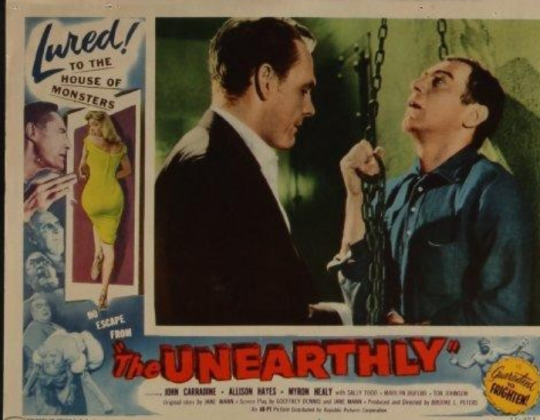
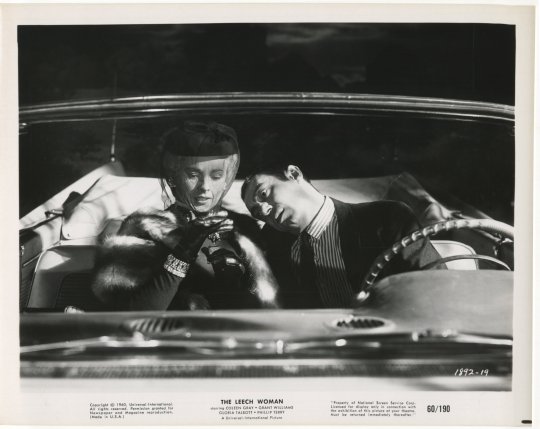
Art Batanides got his first acting start in the 1949-50 KTLA TV series The Armchair Detective. But his first semi-regular role was as a recurring villain in the sci fi television series Rod Brown of the Rocket Rangers. In an interview for Starlog 189, Batanides remembers being followed on the set by one of the extras who would drive him nuts practicing his comedy routines which often involved sound effects like that of a machine gun. It turned out to be comedian Jonathan Winters. He also did a few cheesy sci fi movies. In the first one titled The Unearthly (1957) he played a good guy trying to stop John Carradine’s evil plot. A few years later, Batanides appears as one of victims of June Talbor aka “The Leech Woman” in the movie of the same name. Both films have been lovingly reviewed in Mystery Science Theater 3000. The actor chuckled during his Starlog interview as he recalled how terrible these were, so bad that he and the other actors had to bite their lips.
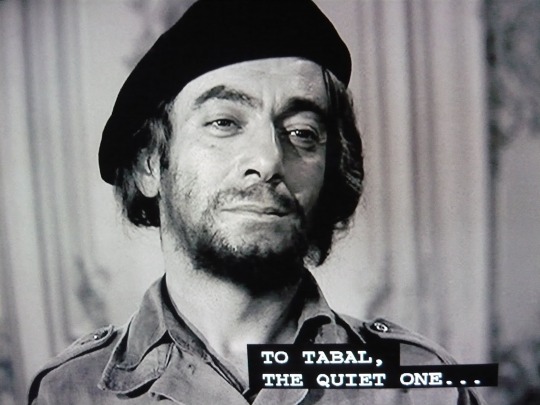
He was cast in two Twilight Zone episodes, “Mr. Denton on Doomsday” and “The Mirror.” In the latter episode, Peter Falk plays a Castro-like revolutionary named Ramos Clemente has a mirror that tells him which of his trusted supporters will attempt to assassinate him. One of his victims is played by Arthur Batanides and is named Tabal, ironically the leader of Clemente’s execution squad. Supposedly Tabal was based on real-life Che Guevera who had played a similar role in Castro’s rise to power.

He played a character named Lt. Garvin, one of the astronauts in “Specimen: Unknown” for The Outer Limits along with two of his former acting school friends, Russell Johnson and Richard Jaeckel. The plot involved astronaut/researchers bringing back plants that they discover on the planet. Unknown to them, the plants soon begin to emit spores and then a deadly gas which threatens the crew. The spores allow them to multiply rapidly. Does this plot sound familiar to Trek fans? Hmmm..... There are several other Star Trek connections as well. 1) this episode was directed by Gerd Oswald who would go on to direct “The Alternative Factor” and “The Conscience of the King.” 2) Robert Justman was the assistant director on the set just as he was for the first two Star Trek pilots. He eventually wound up as the associate producer and then finally the co-producer. 3) Bob Johnson and Vic Perrin both did voice-overs for this episode and also provided the same on several episodes of Star Trek. Vic was most famous as the Control Voice which was heard at the beginning of every show. 4) Finally, Fred Phillips was the makeup supervisor for this episode and performed the same duty on all three seasons of Star Trek. “Specimen: Unknown” earned the highest ratings of the first season. But Batanides bemoaned the fact that the whole show had a low budget and that none of the astronaut suits matched. A complaint we Star Trek fans are familiar with.
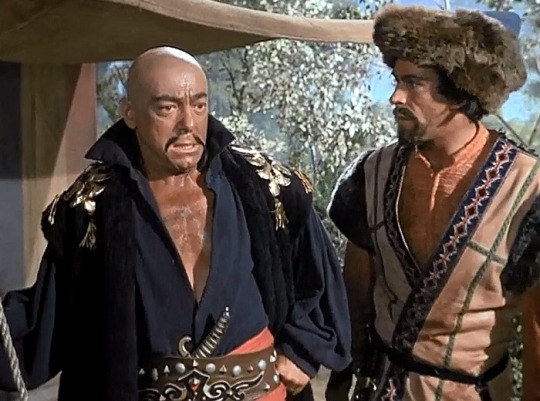
In The Time Tunnel’s episode titled “Attack of the Barbarians” Batanides was Batu Khan, Kubla Khan’s grandson. The actor has quite vivid memories of this character because he had to sit in the makeup chair for two hours and then they covered his head with a stretchy cloth so he appeared bald. But if you look at the results above, it appears the makeup artists did a wonderful job. Star Trek connections abound in this episode as well. Of course Lee Meriwether (Dr. Ann McGregor) would appear with him a few years later as Losira in “That Which Survives.” Another major character, Lt. General Haywood Kirk, was played by Whit Bissell, who also played the beleaguered station manager Lurry in “The Trouble with Tribbles.” There were also connections with two stunt people. Charlie Picerni was James Darren’s stunt double on the show itself (his brother Paul played a Mongol warrior in this episode). We saw him on Star Trek as a security guard in “Day of the Dove.” David Sharpe also performed stunts not only in this episode of The Time Tunnel, but he was also James Daly’s stunt double in “Requiem for Methusaleh” and was a stuntman in “Day of the Dove.”

Batanides next appeared as a caveman leader named Rongah in “The Space Primevals,” a 1967 episode of Lost in Space. Art remembers having to wear the animal skin and wig and doing an impromptu caveman dance in one scene. Rongah and his people worship a giant computer named Protineus. The machine convinces the cave people that the humans are a danger to their people, ordering them to lock up Major West and Dr. Smith. It becomes clear that Protineus is acting much like Landru in “Return of the Archons.” There is even a scene where The Robot tries to confound Protineus by performing a series of magic tricks, much like Captain Kirk confounding computers in many episodes. Not many other Star Trek Connections here except for Sandy Gimpel (a Talosian in “The Cage”) as Will Robinson’s stunt double and Fred Steiner’s music.
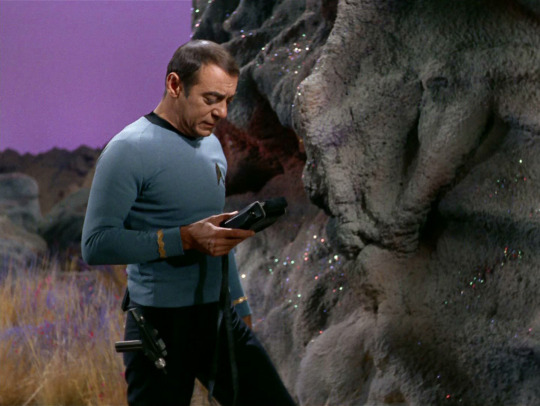
For the most part, Art was not too enthusiastic about taking roles in science fiction, despite the number of them in which he appeared. He was afraid it was going to wind up getting him typecast. When Freiberger offered him the part of D’Amato in “That Which Survives,” he was pleasantly surprised that his character was not the heavy nor did he have to do anything ridiculous like jump around the stage doing a caveman dance. D’Amato was pretty much a straight up role and Batanides enjoyed doing the show. Ironically, the role of D’Amato is one of the two roles for which he is most remembered. Asked what he remembered most about the episode, Batanides recalled they had the planet set on rollers to make it easier to simulate the earthquakes that rocked the planet. He was impressed with all the cast members, especially Leonard Nimoy. Trivia - During the late 1940s, Batanides shared a rented house with Fred Freiberger while they were both taking classes at the Actor’s Studio. It was Fred who hired his friend for the part of D’Amato in the third season of Star Trek. But Fred also helped him land a few roles in another show, The Wild, Wild West. (Freiberger wrote one of the episodes in which Arthur appeared - “The Night of the Dancing Death.”

Freiberger was not the only influential friend he had. Over the years, Batanides had worked on many movie and television shows with director Jerry Paris, another friend of his from the Actor’s Lab. Jerry was made director of the first sequel to Police Academy. As he was looking over the script, he noticed a character who had been scratched out. However, he decided it was a great role and called Art to play Mr. Kirkland, father of the Kirkland family. Batanides today is still most often remembered for his role as Mr. Kirkland and as D’Amato. He retired after doing one last Police Academy movie (City Under Siege) and spent the last ten years of his life doing a few roles but mainly traveling various places with his wife. He died of natural causes in January of 2000.
9 notes
·
View notes